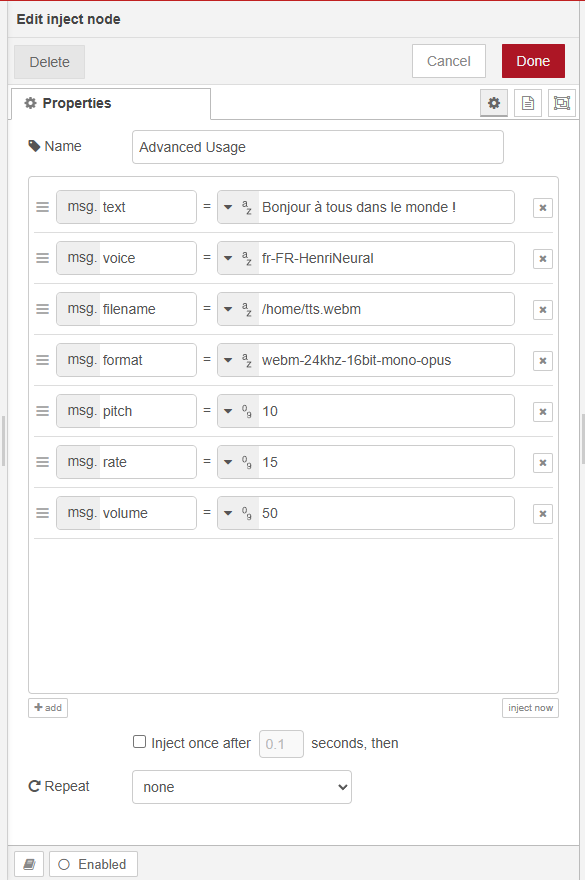node-red-contrib-edge-tts 3.0.4
An simple Azure Speech Service module that uses the Microsoft Edge Read Aloud API.
node-red-contrib-edge-tts
A Node-RED node that converts text to speech using Microsoft Edge's Text-to-Speech service. This node provides a simple way to integrate Azure Speech Service capabilities into your Node-RED flows without requiring an Azure account or API key.
Overview
This node uses the Microsoft Edge Read Aloud API to generate high-quality speech from text. It supports a wide range of voices across multiple languages and dialects, with customizable speech parameters such as rate, pitch, and volume.
Changlog
2025-04-25 :
- Update version 3. x
- Not compatible with version 2. x
- Add voice character
- Add new agent
- Other modifications
Features
- No Azure account or API key required
- 100+ neural voices across multiple languages
- Adjustable speech parameters (rate, pitch, volume)
- Multiple output formats
- Support for SOCKS proxy
- Word and sentence boundary markers (optional)
Installation
Install via Node-RED's Manage Palette:
node-red-contrib-edge-tts
Or install via npm:
npm install node-red-contrib-edge-tts
Requirements
- Node.js >= 16.0.0
- Node-RED >= 3.0.0
Usage
- Drag the "MS Edge TTS" node from the TTS category in the palette to your flow
- Configure the node with your desired voice and other parameters
- Send a message with text to convert to speech


- example:
[
{
"id": "78d47d120957febb",
"type": "edge-tts",
"z": "f0c558c25f0f876f",
"name": "EDGE-TTS",
"voice": "en-US-AriaNeural",
"text": "Hello World",
"filename": "tts.mp3",
"rate": "0",
"pitch": "0",
"volume": "100",
"format": "audio-24khz-48kbitrate-mono-mp3",
"voiceLocale": "",
"sentenceBoundary": "",
"wordBoundary": "",
"x": 590,
"y": 280,
"wires": [
[
"a18e1cce694f3a0b"
]
]
},
{
"id": "07440fc59373f654",
"type": "inject",
"z": "f0c558c25f0f876f",
"name": "basic text to speech",
"props": [
{
"p": "payload"
}
],
"repeat": "",
"crontab": "",
"once": false,
"onceDelay": 0.1,
"topic": "",
"payload": "",
"payloadType": "date",
"x": 370,
"y": 280,
"wires": [
[
"78d47d120957febb"
]
]
},
{
"id": "a18e1cce694f3a0b",
"type": "debug",
"z": "f0c558c25f0f876f",
"name": "debug 1",
"active": true,
"tosidebar": true,
"console": false,
"tostatus": false,
"complete": "true",
"targetType": "full",
"statusVal": "",
"statusType": "auto",
"x": 800,
"y": 280,
"wires": []
},
{
"id": "e562d5502180b41a",
"type": "edge-tts",
"z": "f0c558c25f0f876f",
"name": "EDGE-TTS",
"voice": "en-US-AriaNeural",
"text": "",
"filename": "",
"rate": "0",
"pitch": "0",
"volume": "100",
"format": "audio-24khz-48kbitrate-mono-mp3",
"voiceLocale": "",
"sentenceBoundary": "",
"wordBoundary": "",
"x": 590,
"y": 420,
"wires": [
[
"390baf4035c6e2c2"
]
]
},
{
"id": "6ab5012df8d88444",
"type": "inject",
"z": "f0c558c25f0f876f",
"name": "Advanced Usage",
"props": [
{
"p": "text",
"v": "Bonjour à tous dans le monde !",
"vt": "str"
},
{
"p": "voice",
"v": "fr-FR-HenriNeural",
"vt": "str"
},
{
"p": "filename",
"v": "/home/tts.webm",
"vt": "str"
},
{
"p": "format",
"v": "webm-24khz-16bit-mono-opus",
"vt": "str"
},
{
"p": "pitch",
"v": "10",
"vt": "num"
},
{
"p": "rate",
"v": "15",
"vt": "num"
},
{
"p": "volume",
"v": "50",
"vt": "num"
}
],
"repeat": "",
"crontab": "",
"once": false,
"onceDelay": 0.1,
"topic": "",
"x": 380,
"y": 420,
"wires": [
[
"e562d5502180b41a"
]
]
},
{
"id": "390baf4035c6e2c2",
"type": "debug",
"z": "f0c558c25f0f876f",
"name": "debug 2",
"active": true,
"tosidebar": true,
"console": false,
"tostatus": false,
"complete": "true",
"targetType": "full",
"statusVal": "",
"statusType": "auto",
"x": 800,
"y": 420,
"wires": []
}
]
Input
The node accepts the following input properties:
msg.payload(string): Text to convert to speech (ifmsg.textis not provided)msg.text(string): Text to convert to speech (takes precedence over payload)msg.filename(string): Path to save the audio file (default:tts_[timestamp].mp3)msg.voice(string): Voice to use for speech synthesismsg.rate(number): Speech rate adjustment (-100 to 100)msg.pitch(number): Speech pitch adjustment in Hzmsg.volume(number): Speech volume (0-100)msg.format(string): Audio output formatmsg.agent(string): SOCKS proxy URL (if needed)msg.voiceLocale(string): Voice localemsg.sentenceBoundary(boolean): Enable sentence boundary markersmsg.wordBoundary(boolean): Enable word boundary markers
Output
The node outputs a message with the following properties:
msg.result: Buffer containing the audio datamsg.filename: Path to the saved audio file
Configuration
Basic Settings
- Name: Custom name for the node (optional)
- Voice: Select from 100+ available neural voices
- Text: Default text to convert (can be overridden by input message)
- Filename: Default path to save the audio file
Advanced Settings
- Rate: Speech rate adjustment (-100 to 100)
- Pitch: Speech pitch adjustment in Hz
- Volume: Speech volume (0-100)
- Format: Audio output format (default: audio-24khz-48kbitrate-mono-mp3)
- Voice Locale: Voice locale setting
- Sentence Boundary: Enable sentence boundary markers
- Word Boundary: Enable word boundary markers
- Proxy Agent: SOCKS proxy URL (if needed)
Example Flow
A simple example flow is included in the examples directory.
Supported Voices
The node supports a wide range of voices across multiple languages and dialects, including:
- English (US, UK, Australia, etc.)
- Chinese (Mandarin, Cantonese, etc.)
- And many more
License
Refer to the LICENSE file in the repository.
Credits
This node is based on the msedge-tts package.
Issues and Contributions
Please report any issues or feature requests on the GitHub repository.
